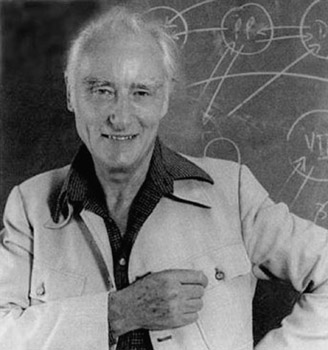| Francis Crick  AKA Francis Harry Compton Crick AKA Francis Harry Compton Crick
Born: 8-Jun-1916
Birthplace: Northampton, England
Died: 28-Jul-2004
Location of death: San Diego, CA [1]
Cause of death: Cancer - Colon
Remains: Cremated (ashes scattered in the Pacific Ocean)
Gender: Male
Religion: Atheist
Race or Ethnicity: White
Sexual orientation: Straight
Occupation: Scientist Nationality: England
Executive summary: Co-Discoverer of the structure of DNA Military service: British Navy (Admiralty Research Laboratory, WWII) Francis Crick's grandfather was a shoemaker and amateur scientist. His Uncle Walter also had a fascination with science, and young Francis conducted some chemical experiments with him (and without him). As a young man, Crick studied physics at University College in London, but was interrupted by service in World War II. Afterward, he resumed his studies at Caius College in Cambridge.
At Cambridge, he met an American named James Watson, and together with their colleague Maurice Wilkins, they tried to elucidate the structure of deoxyribonucleic acid (DNA). They felt Linus Pauling, then the world's most famous chemist, was breathing down their necks, and they desperately wanted to solve the DNA riddle before he did. Pauling had already come close, but it was Crick, Watson, and Wilkins who first showed that the collected clues only made sense if DNA were structured like two twisting, spiral ladders -- the double helix.
Some have suggested that Rosalind Franklin, who worked with Crick, Watson, and Wilkins, may deserve much more credit than she's been given. The evidence clearly shows she was intimately involved in the research of DNA's structure; that she pointed out the flaws in an early Crick-Watson theory that suggested three, not two, DNA chains; and that Crick and Watson used Franklin's x-ray DNA photographs before obtaining her permission. Franklin, however, died in 1958, four years before Crick, Watson, and Wilkins got their Nobel Prizes.
Crick and Watson also theorized on the structure of viruses. Without Watson, Crick has worked on the structures of polyglycine II and collagen, and researched protein synthesis, the genetic code, and acridine-type mutants. After receiving the Nobel Prize Crick refocused his studies on finding neural correlate of consciousness. He worked at the Salk Institute in La Jolla, California.
[1] UCSD Thornton Hospital, San Diego, CA.
Father: Harry Crick
Mother: Annie Elizabeth Wilkins Crick
Brother: A.F. Crick (medical doctor)
Wife: Ruth Doreen Dodd Crick (m. 1940, div. 1947)
Son: Michael F. C. Crick (scientist)
Wife: Odile Crick (m. 1949)
Daughter: Gabrielle A. Crick
Daughter: Jacqueline M. T. Crick
High School: Mill High School (North London)
Nobel Prize for Medicine 1962 (with James Watson and Maurice Wilkins)
Royal Medal 1972
Copley Medal 1975
Lasker Award Basic Medical Research Award (1960)
CSICOP Fellow
Salk Institute for Biological Studies Nonresident Fellow
International Academy of Humanism Laureate
Risk Factors: LSD
Requires Flash 7+ and Javascript.
Do you know something we don't?
Submit a correction or make a comment about this profile
Copyright ©2019 Soylent Communications
|